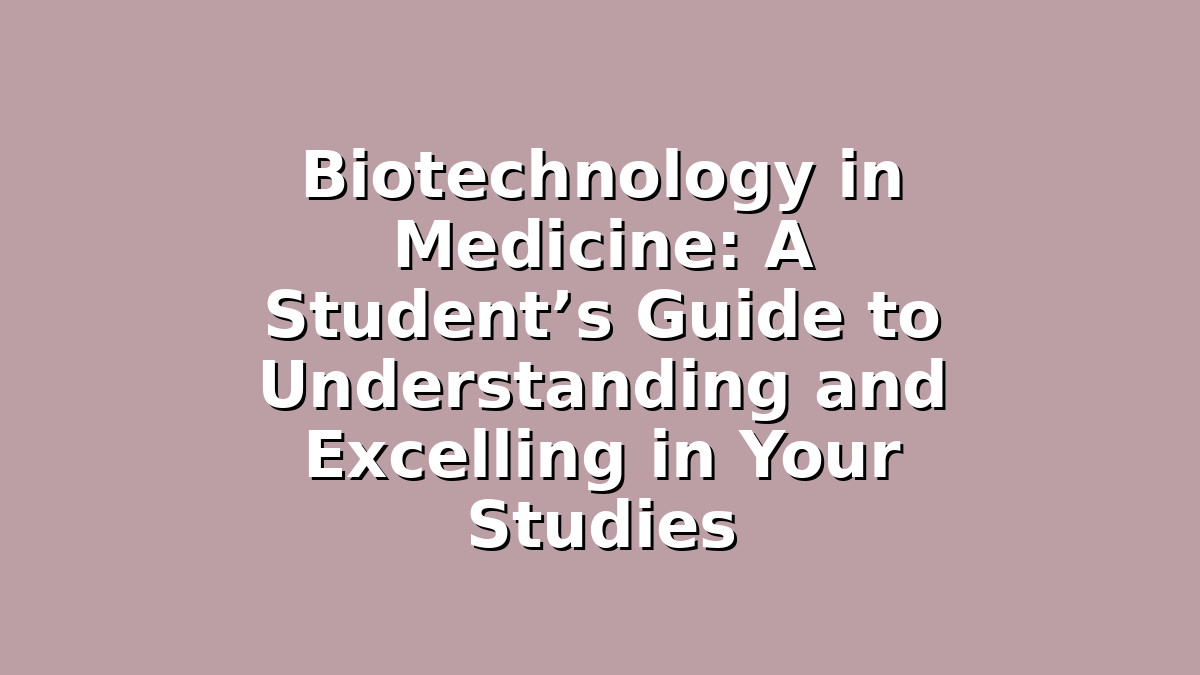Introduction
Biotechnology in medicine is a rapidly evolving field that combines biology and technology to improve healthcare outcomes. For students preparing for exams or seeking effective study strategies, understanding this subject can be both exciting and challenging. Whether you’re studying for biology, medicine, or biotechnology courses, grasping the core concepts and applications of biotechnology in medicine can give you a significant advantage. This article will help you explore the fundamental aspects of biotechnology in medicine, provide detailed study tips tailored to complex scientific topics, and encourage you to stay motivated as you prepare for your exams.
Section 1: Grasping the Basics of Biotechnology in Medicine
Before diving into detailed study sessions, it’s essential to have a strong foundation in what biotechnology in medicine actually means. Biotechnology typically involves manipulating living organisms or their systems to develop products that improve human health. In medicine, this includes genetic engineering, molecular diagnostics, drug development, and regenerative therapies.
Key areas to focus on include:
– Genetic engineering: Understand how scientists modify genes to treat diseases like cystic fibrosis or sickle cell anemia.
– Molecular diagnostics: Learn how biotechnology enables early detection of illnesses such as cancer through PCR and other techniques.
– Biopharmaceuticals: Study how biologically derived drugs, like insulin or monoclonal antibodies, are produced.
– Regenerative medicine: Explore stem cell therapy and tissue engineering for repairing damaged tissues.
Study tip: Create concept maps to link these topics visually. This helps organize your knowledge and shows how different areas interconnect in medical biotechnology.
Section 2: Effective Study Strategies for Complex Scientific Material
Biotechnology in medicine involves many technical terms, processes, and case studies. To manage this complexity, adopt study techniques that enhance comprehension and retention.
– Break down information into smaller chunks: Instead of trying to learn everything at once, focus on mastering one concept at a time, such as CRISPR gene editing or vaccine development.
– Use active recall and spaced repetition: Test yourself regularly on key terms and definitions. Apps like Anki can help schedule reviews to strengthen memory.
– Incorporate multimedia resources: Videos, animations, and interactive simulations make understanding processes like DNA replication or monoclonal antibody production easier.
– Practice applying concepts: Work through past exam questions or case studies that require you to explain how biotechnology is used in diagnosing or treating diseases.
– Join study groups: Discussing topics with peers can clarify doubts and provide new perspectives.
Study tip: Teach what you’ve learned to a friend or even to yourself out loud. Explaining concepts in your own words reinforces understanding and highlights areas needing improvement.
Section 3: Staying Motivated and Managing Exam Stress
Studying a demanding subject like biotechnology in medicine can sometimes feel overwhelming. Maintaining motivation and managing stress are crucial for effective learning and exam success.
– Set achievable goals: Break your study plan into daily or weekly targets. Celebrate small wins, such as mastering the mechanism of action of a biopharmaceutical.
– Create a dedicated study environment: Choose a quiet, organized space free from distractions.
– Balance study sessions with breaks: Use techniques like the Pomodoro method (25 minutes study, 5 minutes break) to maintain focus.
– Practice self-care: Regular exercise, healthy eating, and adequate sleep improve cognitive function and stress resilience.
– Stay curious: Remind yourself why this subject matters. Biotechnology is at the forefront of medical innovation, and your knowledge could one day contribute to groundbreaking treatments.
Study tip: Visualize your success and keep positive affirmations handy. When you feel stuck, remind yourself that every expert started as a beginner and that persistence pays off.
Conclusion
Biotechnology in medicine is an exciting, impactful field that offers many fascinating topics for students to explore. By building a solid foundation, using effective study techniques, and maintaining a positive mindset, you can master this subject and excel in your exams. Remember, studying complex material is a journey—be patient with yourself and stay committed. Your hard work now will lay the groundwork for future academic and professional success in the world of medical biotechnology.

Responses